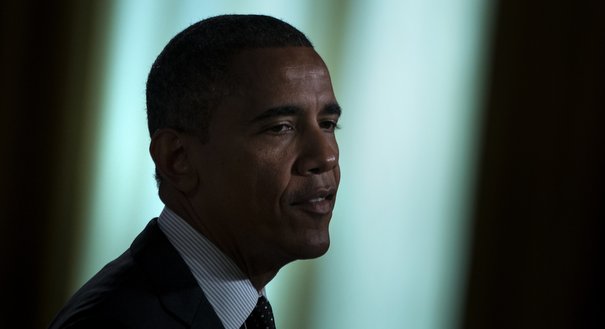David Rothkopf
{
"authors": [
"David Rothkopf"
],
"type": "legacyinthemedia",
"centerAffiliationAll": "",
"centers": [
"Carnegie Endowment for International Peace"
],
"collections": [],
"englishNewsletterAll": "",
"nonEnglishNewsletterAll": "",
"primaryCenter": "Carnegie Endowment for International Peace",
"programAffiliation": "",
"programs": [],
"projects": [],
"regions": [
"North America",
"United States",
"Western Europe",
"France",
"Germany"
],
"topics": [
"Political Reform",
"Security",
"Military",
"Foreign Policy"
]
}
Source: Getty
Mr. President, We Can Handle the Truth
Either the president didn’t know about programs he should have been aware of, or he knew and not only approved the overreach but then lied about it.
Source: Foreign Policy
It has been revealing to watch the White House chase the NSA surveillance story. At first, when Edward Snowden's revelations broke, White House officials sought to make the story about him. Snowden was a traitor and the issue was how quickly he could be brought to justice.As the first wave of revelations about wholesale U.S. harvesting of data and phone records broke, they maintained this stance. The administration still focused on portraying itself as the victim of a betrayal. Again, White House spokespeople did not address the ethics of what the U.S. government had been doing, instead either diverting to the rationale for the scope of such wide-ranging surveillance operations or offering the excuse that running an intelligence system with more than half a million people naturally comes with operational security risks and, inevitably, there are contractors of dubious background like Snowden, who receive top-secret clearance.
When Snowden sought asylum, the United States made the story about the other governments that were collaborating with the young rogue fugitive. Tensions rose with Russia when it gave Snowden a temporary and then a longer-term home. Latin American nations that offered or considered offering Snowden asylum were framed as pariahs. We even collaborated with allies in Europe to ground the plane of Bolivia's president in the hopes of nabbing the former contractor.
As the story then spread and countries like Brazil and Mexico were discovered to be the targets of espionage, the White House's response publicly and in private to those governments was "everybody does it." Again, no discussion was made of why we were spying on these friends or, if assertions of spying against commercial targets like Petrobras were true, what the rationale was for this kind of economic espionage. After all, the initial arguments were that this unprecedentedly massive program was to protect us from terrorists and other enemies. Was there a hidden Petrobras-al Qaeda connection that we didn't know about?More recently, the White House's reaction has revealed the double standard we have when it comes to surveilling our friends. If Brazil or Mexico is offended, that's one thing, more easily shrugged off apparently. But when it was revealed that Germany, one of our closest allies, was also targeted (triggering a firestorm of anger in that country ... compounded by anger in also-targeted France and Spain), we treated it differently. These particular complaints now warranted a different kind of response. In this instance, both public and private assurances were given to senior German officials by both National Security Advisor Susan Rice and later President Barack Obama. The newly adopted argument was that the president had no idea this was going on and that it was stopped.
This approach was subsequently challenged in stories in the German magazine Bild and in the Los Angeles Times, leading to more awkwardness for the White House. Now we weren't just spying on the Germans and others -- we were lying to them. And the White House was asking the American people to accept ignorance as its excuse. What a fine choice. Either the president didn't know about programs he should have been aware of, or he knew and not only OK'd the overreach but then lied about it.
This astonishingly lame response -- called "pathetic" by the New York Times editorial board, a group that is not seen as reflexively anti-Obama -- was then compounded by an idea floated to the New York Times by the National Security Council: that the president was considering reforms that would ban eavesdropping on presidents and prime ministers of allies. Quite apart from raising the tough question of who our "real" allies are or defining who is fair game for spying, this policy tweak is not reform but spin. What if there were 20 allies who qualified? Does this mean we solve the NSA surveillance overreach problem by exempting a small, pre-selected group out of hundreds of millions from the data and phone-records eavesdropping and warehousing efforts of the U.S. government? It misses the point that there are worse things about this program than spying on the leaders of friendly nations.
The core issues of the gross and excessive surveillance associated with the NSA revelations are not about spying on friends. Wholesale harvesting of the emails and phone records of Americans is a dangerous departure from the principles of limiting government access to private information that has existed since the beginnings of the republic. Creating back doors by which Americans can be eavesdropped on via collecting overseas data resources is another worrisome dimension of these programs. Serially violating the privacy of tens of millions of foreign citizens is another. So is the suggestion that the threat of terrorism warrants such sweeping violations. (It is a real threat, but it has been abused to justify overreach. Our fears have once again gotten the better of us -- as they did when they were used to justify wrongheaded wars in Iraq and Afghanistan or mistaken and abusive programs like the Patriot Act or the use of torture or the serial violation of sovereignty wrought via our drone programs.)
Stepping away from the moral, ethical, and strategic concerns raised by such programs, there are serious questions to be asked about the practical management of intelligence programs. Were the benefits derived from such programs worth the risks they apparently entailed? Their discovery had to be seen by a prudent intelligence community senior officer as a risk in a system in which the number of people with top-secret clearance exceeded half a million. What possible tangible benefit came from listening in on a Brazilian oil company? What advantage was gained from listening in on German Chancellor Angela Merkel? And is it worth the fallout that this scandal is producing?
That fallout is not, the White House must now see, purely the political or diplomatic embarrassment it has generated. One industry group has estimated that the costs to U.S. companies likely to get frozen out of foreign tech deals because they are seen as suspect or too vulnerable to the NSC might run as high as $35 billion. Worse, this entire episode will be used by foreign governments to turn back the tide of globalization and increased access to information (and the democratizing forces engendered by it) that the information revolution was bringing. It will be an excuse for countersurveillance programs, restrictive Internet governance regimes, censorship, and deepening cyberconflict. (This move toward a fragmentation of the Internet into national regimes, some imbued with barriers to entry or exit, is what I called cyber-nationalism in my FP column last week.)
These are reversals to American interests overseas that are far more damaging than anything terrorists could have done to us. Just as Iraq was. Just as Afghanistan was. Just as Abu Ghraib was. Just as the Patriot Act was. We are becoming victims not of terrorists but of terror, of our own fears and our emotional, ill-considered overreactions to them.
For the White House, it is now time to stop chasing this story and get ahead of it. It is time to say, without acknowledging secret programs or compromising security, "We were wrong. We went too far. We reserve the right to defend ourselves using all reasonable means at our disposal. But we can't do so in ways that compromise the values, alliances, and trust that are also vital pillars of our strength."
It is time therefore to welcome Sen. Dianne Feinstein's calls for a top-to-bottom review of intelligence programs. It is time to embrace emerging congressional initiatives to limit data warehousing and wholesale privacy violations. And behind the scenes, it is time to do what should have been done at the outset at the highest levels. The president and his top aides should identify our national security goals, the objectives we seek to advance, and risks we seek to mitigate and then determine what role the intelligence community ought to play in advancing those goals. This will mean setting parameters determined by our resource limitations and by our laws and by our values. It will also mean carefully weighing downsides versus returns and consequently reining in our intelligence community -- not out of lack of appreciation for what it does but precisely because we value it and the people within it and we do not seek to put them at unnecessary risk in pursuit of programs that should not have been undertaken in the first place.
About the Author

Former Visiting Scholar
David Rothkopf was a visiting scholar at the Carnegie Endowment as well as the former CEO and editor in chief of the FP Group.
- How Bush, Obama, and Trump Ended Pax AmericanaIn The Media
- A Bigger ClubhouseIn The Media
David Rothkopf
Recent Work
Carnegie does not take institutional positions on public policy issues; the views represented herein are those of the author(s) and do not necessarily reflect the views of Carnegie, its staff, or its trustees.
More Work from Carnegie Endowment for International Peace
- Iran Is Pushing Its Neighbors Toward the United StatesCommentary
Tehran’s attacks are reshaping the security situation in the Middle East—and forcing the region’s clock to tick backward once again.
Amr Hamzawy
- The Gulf Monarchies Are Caught Between Iran’s Desperation and the U.S.’s RecklessnessCommentary
Only collective security can protect fragile economic models.
Andrew Leber
- Duqm at the Crossroads: Oman’s Strategic Port and Its Role in Vision 2040Commentary
In a volatile Middle East, the Omani port of Duqm offers stability, neutrality, and opportunity. Could this hidden port become the ultimate safe harbor for global trade?
Giorgio Cafiero, Samuel Ramani
- Europe on Iran: Gone with the WindCommentary
Europe’s reaction to the war in Iran has been disunited and meek, a far cry from its previously leading role in diplomacy with Tehran. To avoid being condemned to the sidelines while escalation continues, Brussels needs to stand up for international law.
Pierre Vimont
- Lessons Learned from the Biden Administration’s Initial Efforts on Climate MigrationArticle
In 2021, the U.S. government began to consider how to address climate migration. The outcomes of that process offer useful takeaways for other governments.
Jennifer DeCesaro








